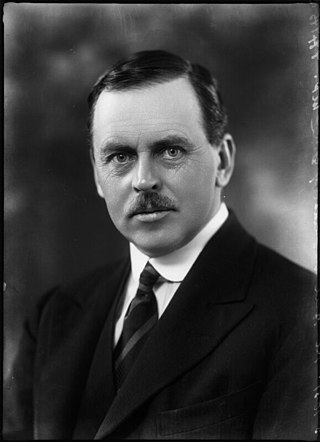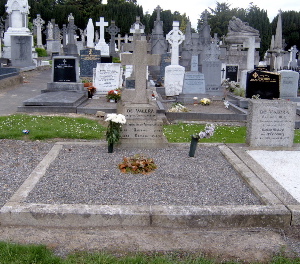Related Research Articles

Baron Harlech, of Harlech in the County of Merioneth, is a title in the Peerage of the United Kingdom. It was created in 1876 for the Conservative politician John Ormsby-Gore, with remainder to his younger brother William. He had previously represented Carnarvon and North Shropshire in the House of Commons. Ormsby-Gore was the eldest son of William Ormsby-Gore, Member of Parliament for County Leitrim, Carnarvon and North Shropshire, and the great-great-great-grandson of William Gore, third and youngest son of Sir Arthur Gore, 1st Baronet, of Newtown, second son of Sir Paul Gore, 1st Baronet, of Magharabag, whose eldest son Paul was the grandfather of Arthur Gore, 1st Earl of Arran.

William David Ormsby-Gore, 5th Baron Harlech, known as David Ormsby-Gore until June 1961 and as Sir David Ormsby-Gore from then until February 1964, was a British diplomat and Conservative politician.
William Richard Ormsby-Gore, 2nd Baron Harlech, was an Anglo-Irish peer and Member of Parliament.
Francis David Ormsby-Gore, 6th Baron Harlech, was a peer in the United Kingdom. In 1985 he inherited the property in Wales and the Harlech title from his father.

William George Arthur Ormsby-Gore, 4th Baron Harlech,, was a British Conservative politician and banker.
William Ormsby-Gore, known as William Gore until 1815, was a British Member of Parliament.

The Solicitor-General for Ireland was the holder of an Irish and then United Kingdom government office. The holder was a deputy to the Attorney-General for Ireland, and advised the Crown on Irish legal matters. On rare occasions, there was also a Deputy Attorney-General, who was distinct from the Solicitor-General. At least two holders of the office, Patrick Barnewall (1534–1550) and Sir Roger Wilbraham (1586–1603), played a leading role in Government, although in Barnewall's case, this may be partly because he, was also King's Serjeant. As with the Solicitor General for England and Wales, the Solicitor-General for Ireland was usually a barrister rather than a solicitor.
This is a list of people who served as Lord Lieutenant of Merionethshire. After 1762, all Lord Lieutenants were also Custos Rotulorum of Merionethshire. The office was abolished on 31 March 1974, and the area is now covered by the Lord Lieutenant of Gwynedd and Lord Lieutenant of Clwyd.
George Ralph Charles Ormsby-Gore, 3rd Baron Harlech,, was a British soldier and Conservative Member of Parliament.
John Ralph Ormsby-Gore, 1st Baron Harlech, was a British peer and Conservative Member of Parliament.

This is a list of notable people buried in Glasnevin Cemetery.
The High Sheriff of Clare was a High Sheriff title. Records show that the title was in existence from at least the late 16th century, though it is not used today in the modern Republic of Ireland. The title existed within County Clare in the west of Ireland during the time of the Kingdom of Ireland and then as part of the United Kingdom of Great Britain and Ireland.
The Master of the Rolls in Ireland was a senior judicial office in the Irish Chancery under English and British rule, and was equivalent to the Master of the Rolls in the English Chancery. Originally called the Keeper of the Rolls, he was responsible for the safekeeping of the Chancery records such as close rolls and patent rolls. The office was created by letters patent in 1333, the first holder of the office being Edmund de Grimsby. As the Irish bureaucracy expanded, the duties of the Master of the Rolls came to be performed by subordinates and the position became a sinecure which was awarded to political allies of the Dublin Castle administration. In the nineteenth century, it became a senior judicial appointment, ranking second within the Court of Chancery behind the Lord Chancellor of Ireland. The post was abolished by the Courts of Justice Act 1924, passed by the Irish Free State established in 1922.
This is a list of lawyers who held the rank of serjeant-at-law at the Bar of Ireland.
The High Sheriff of Leitrim was the British Crown's judicial representative in County Leitrim, Ireland from c.1582 until 1922, when the office was abolished in the new Free State and replaced by the office of Leitrim County Sheriff. The sheriff had judicial, electoral, ceremonial and administrative functions and executed High Court Writs. In 1908, an Order in Council made the Lord-Lieutenant the Sovereign's prime representative in a county and reduced the High Sheriff's precedence. However the sheriff retained his responsibilities for the preservation of law and order in the county. The usual procedure for appointing the sheriff from 1660 onwards was that three persons were nominated at the beginning of each year from the county and the Lord Lieutenant then appointed his choice as High Sheriff for the remainder of the year. Often the other nominees were appointed as under-sheriffs. Sometimes a sheriff did not fulfil his entire term through death or other event and another sheriff was then appointed for the remainder of the year. The dates given hereunder are the dates of appointment. All addresses are in County Leitrim unless stated otherwise.
The High Sheriff of Mayo was the British Crown's judicial representative in County Mayo, Ireland from the 16th century until 1922, when the office was abolished in the new Free State and replaced by the office of Mayo County Sheriff. The sheriff had judicial, electoral, ceremonial and administrative functions and executed High Court Writs. In 1908, an Order in Council made the Lord-Lieutenant the Sovereign's prime representative in a county and reduced the High Sheriff's precedence. However, the sheriff retained his responsibilities for the preservation of law and order in the county. The usual procedure for appointing the sheriff from 1660 onwards was that three persons were nominated at the beginning of each year from the county and the Lord Lieutenant then appointed his choice as High Sheriff for the remainder of the year. Often the other nominees were appointed as under-sheriffs. Sometimes a sheriff did not fulfil his entire term through death or other event and another sheriff was then appointed for the remainder of the year. The dates given hereunder are the dates of appointment. All addresses are in County Mayo unless stated otherwise.